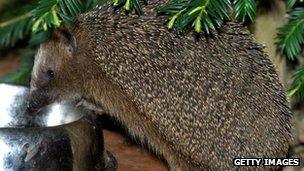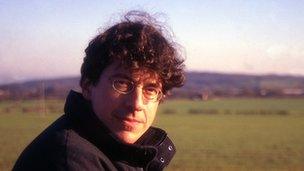Stark warning over the state of nature
- Published
- comments

Hedgehog numbers have declined greatly, according to the report
Another day, another depressing report detailing the remorseless decline of British wildlife. Some things never change.
And that, in itself, is part of the problem. The constant drip-feed of bad news on the environment has inured us to the litany of loss.
It's partly to break that spell, and partly because there comes a point in any spiral of decline when a line has to be drawn, that 25 of the country's leading wildlife and conservation groups have decided to pool the misery and publish a single, shocking stock-take of the British Countryside.
You can see more about the report State of Nature here but be warned, it's grim reading. More than 60% of the 3,000 species surveyed have declined over the last 50 years, including some much loved and familiar plants and animals like the lesser spotted woodpecker, the hedgehog, the natterjack toad and the High Brown Fritillary and Wood White butterflies.
The report is intended to act as a wake-up call, but it's also sparked a debate over the direction of conservation strategy. Business as usual - the orderly management of decline - is not an option according to the RSPB's Dr Mark Eaton.
David Attenborough: We've got this extraordinary expertise in destroying, poisoning and knocking down things
"We have to make this loud and clear. The conservation business as it is is not succeeding. We're loosing this battle, and we need to get together and think about how we address that".
Time perhaps for a radical re-think. One alternative strategy being championed by George Monbiot is known as re-wilding. In his latest book , Feral, the environmental campaigner urges conservationists to abandon entrenched positions based on holding the line against development and defending ever smaller enclaves and reserves.
Instead, he argues, campaigners need to get on the front foot, actively encouraging and extending nature's access in all the places we don't specifically need roads or houses or crops.

Environmentalist George Monbiot favours re-wilding unused land
"Re-wilding is not an attempt to return to some primeval state, that by definition is impossible. It's an attempt to allow the natural dynamism of the ecosystem to get started again, and actually if you take down the fences, block up the drainage ditches, have large enough areas of land and reintroduce some of the missing species, nature doesn't need our help at all".
Re-wilding may not be the answer everywhere, but it seems clear conservation strategies need to change. Speaking on the Today programme, Sir David Attenborough, who will launch the State of Nature report at the Natural History Museum this evening, described it as a stark warning.
"There's no single answer. What you have to do to help bats differs from what you have to do to help frogs or pond life. We've got this extraordinary expertise in destroying things, in poisoning things and in knocking things down, so perhaps it's not that surprising."